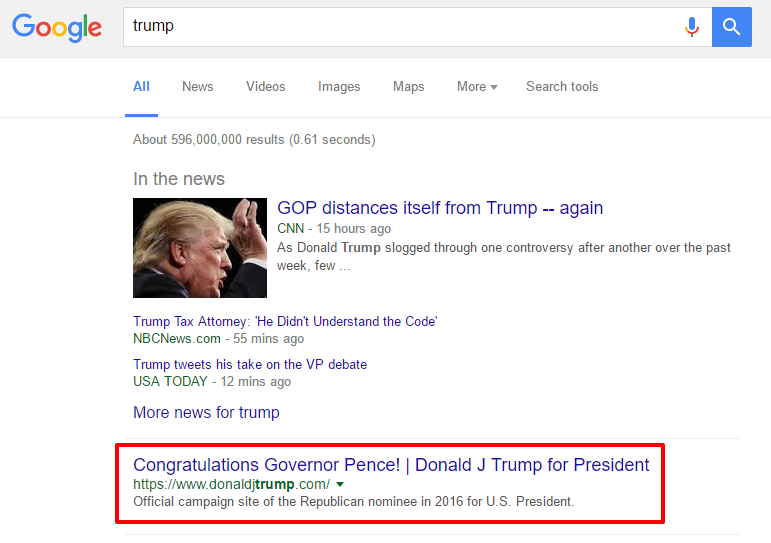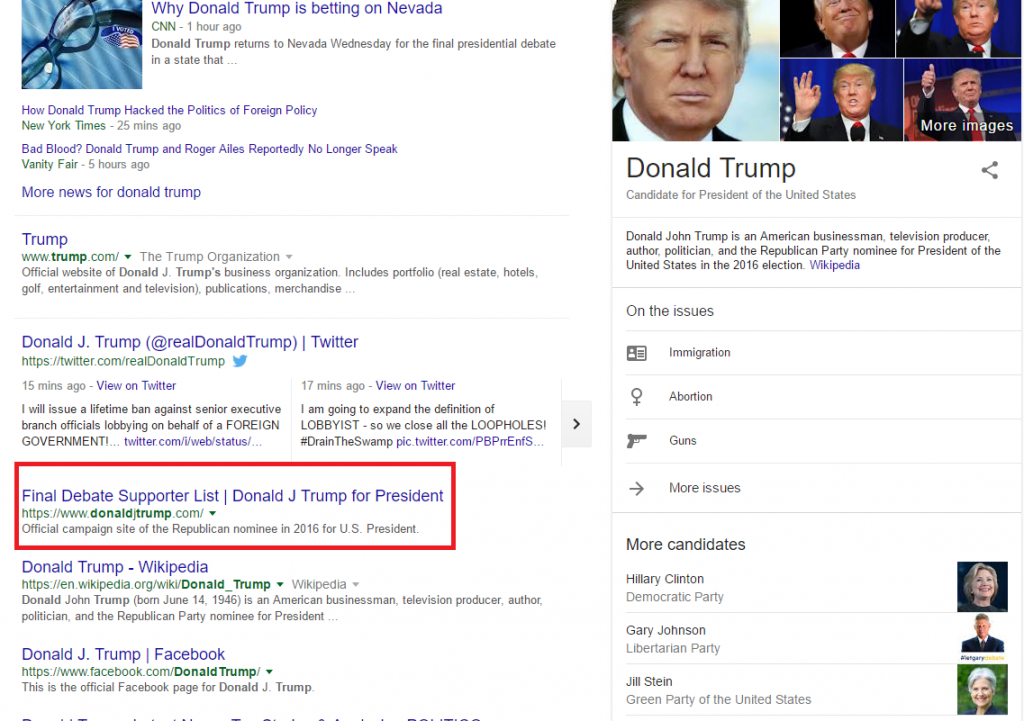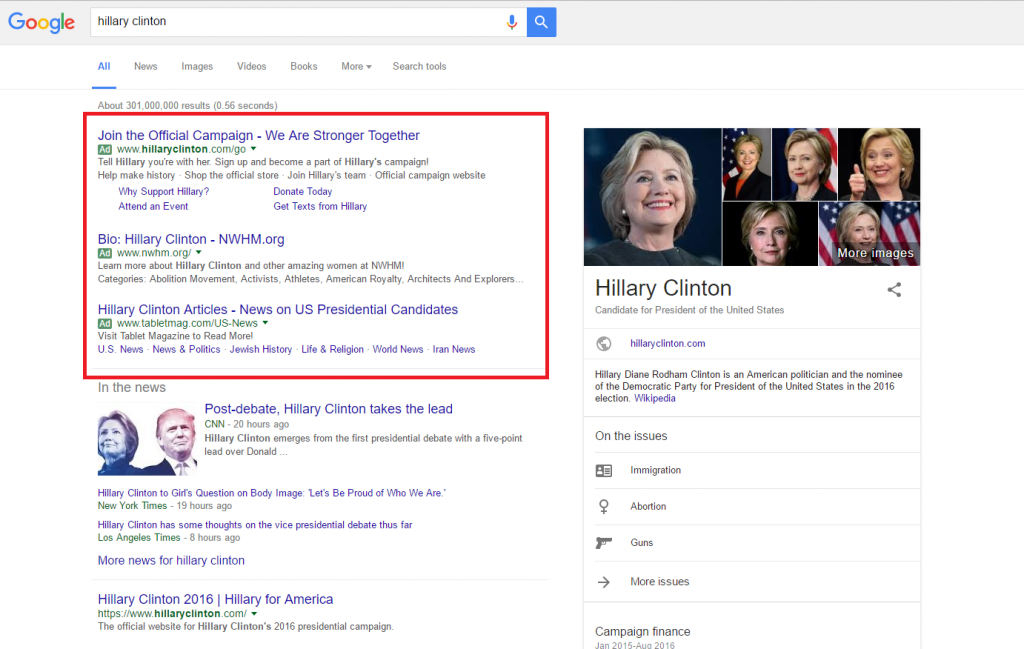
A simple Google search for each of the 2016 Presidential Candidates’ names reveals a lot about the digital strategies utilized by each campaign’s web strategists, as well as how Google organizes and displays information they find relevant to users’ queries.
**A quick note on timeliness: in this exhaustively fast paced election, the digital landscape changes daily—even hourly. News stories are updated upon the hour—even by the minute, which in turn updates and changes the Search Engine results for these two campaigns day-to-day. Google’s indexing of information prioritizes fresh content, therefore relevant news articles (of which there are MANY concerning these two candidates) are constantly being updated and pushed to the top of the search results, displayed in their own section of the results page.
The Digital Marketing team at ACS Web Design & SEO also apologizes in advance, if you –like us–are part of the 59 percent of Americans who are sick and tired of the election.
Trump: Organic Search Results, Display Ads, Meta-Data Strategies

A Google search for “trump” performed the morning after the Vice-Presidential debates (10/5/16) reveals various news article results at the top, and then the eye-catching Meta Title of “Congratulations Governor Pence!” on the top organic result (which is the official Trump for President page).
A Meta Title or “Title Tag” is the main text that describes an online webpage. Primarily used by robots that crawl websites to learn information in order to rank sites in the search results, SEO Strategists understand the importance of this On Page element and will optimize it to reflect important keywords they want their page ranking for.
While Meta Titles are often used for increasing a page’s keyword positioning in the SERPs, they can also be used for compelling a user to click through from the search results, as is the case in Donald Trump’s Official Election website.
In the case of the Digital Strategy team working for the Trump campaign, it appears as if they have adopted the strategy of updating the homepage Meta Title of Trump’s official website after newsworthy events, in order to make the page stand out to users searching “trump” related queries and encourage click-throughs to the site.
“trump” Google search performed the day of the final Presidential Debate, October 19, 2016

On the day of the last Presidential debate, a search for “trump” reveals an updated homepage Meta Title on the Official site homepage search result, which reads “Final Debate Search List.” Again, the updated meta title catches the user’s eye and, in this case, piques their curiosity, thus encouraging click-throughs to the site.
The Digital Strategy on Trump’s camp also involves Display Advertising, which is a type of online advertising that comes in several formats; including banner ads, images, flash videos and more.
In the case of the Display Ads created by Trump’s Digital Strategists, they utilized a specific type of Display Advertising known as “Remarketing” or “Retargeting.” Examples of these ads can be seen below:


Remarketing is a form of Display Advertising the ACS Digital Marketing team often utilizes when implementing our client-specific web strategies. It is an online marketing technique that enables advertisers to reach out to visitors who have already visited a website, by following around the website visitor and displaying specific ads on other sites they visit. Using the Google Display Network, PPC professionals can target an audience who is already familiar with a website’s brand & products by showing ads to people who have already visited your website.
The main purpose of display advertising is to deliver general advertisements and brand messages to website visitors, and encourage click-throughs to the website through some sort of Call to Action- in the case of the above ads “Donate Now” and “Enter Now” are the Call to Actions.
Clinton: Pay-Per-Click Ads, Social Media Profiles, Google+ Page Optimizations
In contrast, the Digital Strategy team for Hillary Clinton appears to be less aggressive in their strategies. In performing searches for “Hillary Clinton” on the same dates; after the Vice-Presidential debates (10/5/16) and after the third and final Presidential Debate (10/20/16), we discovered a few notable changes to the Google search engine results.
“hillary clinton” Google Search performed October 5, 2016 – the day after the Vice-Presidential Debate

A Google search for “hillary clinton” performed the day after the Vice-Presidential debates showcases the use of PPC, or Pay-Per-Click ads, many of which are utilized with the purpose of encouraging users to donate to Clinton’s campaign.
PPC ad campaigns are generally maintained by Internet marketing strategists, using Google AdWords. They are, by many measures, the most popular paid search platform used by search marketers, followed by Bing Ads, which also serves a significant portion of ads on Yahoo.
Of note here is the clearly different purposes and strategies behind these PPC ads; the first PPC result is run by the official Clinton campaign and has the straight-forward goal of increasing donations to the campaign. The other two PPC results are paid for by third party organizations – the National Women’s History Museum and Tablet Magazine. While we can’t speak directly to the strategies used by these third party organizations, their approach of bidding on an in-demand keyword that is relevant to the services they provide with the goal of increasing brand visibility and website click-throughs, is a fairly common pay-per-click strategy that our Adwords certified team utilizes in our own digital marketing strategies for our clients.
“hillary clinton” Google Search performed October 20, 2016 – the day after the final Presidential Debate.

A Google search for “hillary clinton” performed the day after the final Presidential Debate on October 20, 2016 reveals a few interesting things of note:
- Unlike the Trump campaign’s strategy of continuously updating the homepage Meta Title with eye-catching messaging, Hillary’s homepage continues to display the message “Hillary for America: Hillary Clinton 2016.”
- The day after the final Presidential debate, there are no paid AdWords campaigns being run for her name.
- Lastly, of interest is the Clinton campaign’s use of Google+ profiles in injecting their own story into the search results.
Google Plus pages provide local businesses, brands and organizations with a public identity and presence, which is reflected in the Google search results pages. In the case of Hillary Clinton’s Google+ page, ( 2017 Update: All posts purged or hidden after election ) it appears that her Digital Marketing team is taking advantage of the strong ranking signals Google+ pages can provide in the Google SERPs (search engine results pages).
In the screen-shot above, we have highlighted the large space taken up in the SERPs by posts from Clinton’s Google+ page, which showcases a unique strategy Clinton’s Digital Strategists may have implemented. According to a recent study on the ranking factors of Google+:
- Google+ posts are crawled and indexed almost immediately, as Google’s algorithm prioritizes fresh and new content.
- Google+ is optimized for search relevance
- Google+ posts pass link equity: links to posts are crawled and indexed by Google, which in turn sends.
This means that it is possible Clinton’s Digital Strategy team has optimized her Google+ page, creating G+ posts with purpose of ranking during searches for the Candidates name. In other words, Clinton’s Digital Marketing team may have taken advantage of the strong ranking signals provided by the Google+ platform to effectively shape the search results page with their own messaging.
Looking for creative Digital Marketing solutions for your business?
From managing PPC & Remarketing Campaigns, to analyzing and optimizing our clients’ websites in order to improve ROI for our Digital Marketing strategies, the Google Advertising Certified team at ACS is ready to help!
Contact Us today to learn how we can help improve your company’s search positioning and brand awareness in order to better connect you to your audience.
